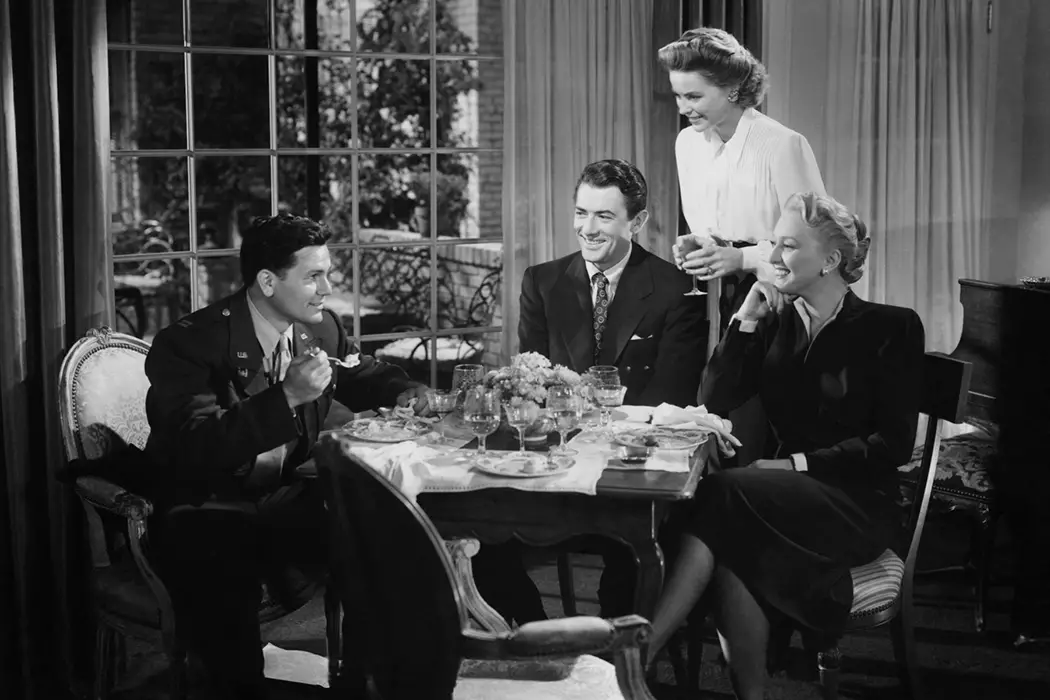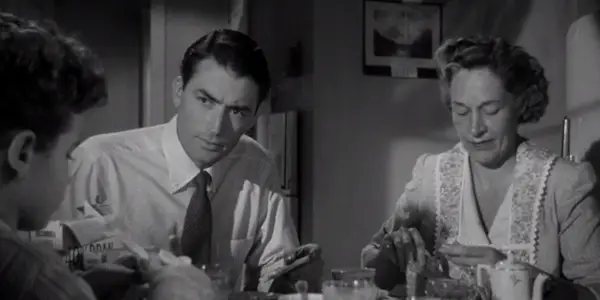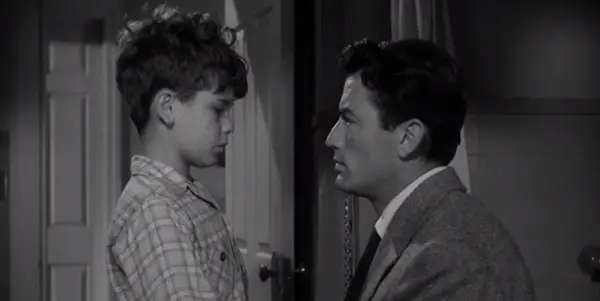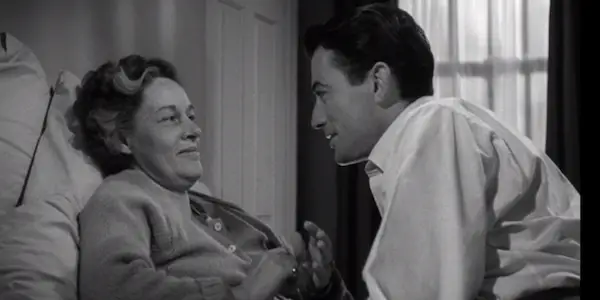“Kids Are So Decent To Start With”: The Role Of Family In GENTLEMAN’S AGREEMENT

Sophia Cowley is a young writer, yogi, feminist and film…
Elia Kazan’s 1947 classic, Gentleman’s Agreement, hit theaters at a time when the U.S. had suddenly become the largest, most affluent center of Jewish culture in the world. Thousands of Jewish immigrants were admitted into the US after WWII, which saw the destruction of virtually every Jewish epicenter across Europe. Kazan, who directed other masterpieces such as East of Eden and On the Waterfront, set out to release a film that would attempt to tackle anti-Semitism in post-WWII America (of course, this effort came with a hefty dose of cultural appropriation).
During its post-war aftermath, the US got back to the basics, at least in terms of family values. More and more, couples flocked to the suburbs and began settling down. They spent money on household appliances and cars, leaving fewer funds for the luxury of cinema.
However, only one year before Gentleman’s Agreement was released, Frank Capra came out with his epic, It’s a Wonderful Life, which set the tone for family-and kid-oriented films of the late 1940s. A few other examples from the ’40s include Pinocchio, Bambi and Fantasia. Families became the new target audience, as American values shifted from from wartime patriotism to the homely, domesticated life.
The Birth of Suburbia
After WWII, the U.S. Congress passed a law titled the “GI Bill of Rites,” which was designed to provide veterans with discounted school tuition, lowered mortgage rates, and financial support. The so-called “bill of rites” unjustly favored white veterans and often dismissed or rejected claims made by African-Americans or other people of color.

As a result of this new law, (white) veterans were able to purchase new homes, settle down and have children in “unprecedented numbers.” Privileged (i.e. white, gentile) Americans experienced new comforts, like cozy, carpeted homes. The US economy grew exponentially, thanks in part to the GI bill, large corporate mergers and a rapidly growing automobile industry. Consumerism skyrocketed and the US rapidly became the “world’s richest country.”
Meanwhile, the birth of suburbia kept families stationed mainly at home, looking after their children and tending to domestic duties. Initially, Jewish families were shut out from many residential complexes, in a blatant act of discrimination by corporate builders. This housing restriction was declared illegal by the Supreme Court in 1948, an (albeit delayed) sign of the changing tides. Over time, the suburban migration and a rising Jewish middle-class actually lead to a decline in anti-Semitism.
“I Was Jewish for Six Months”
In the film, Gregory Peck plays Philip, a reporter for a “liberal” New York magazine. Over a period of six months, Philip pretends to be Jewish (an idea given to him by his boss’ niece) while he writes a special exposé on anti-Semitism.
Philip goes undercover, so to speak, introducing himself under the name, “Phil Greenberg.” He gets to the heart of anti-Semitism in everyday life, calling people out on their offensive remarks everywhere from the bar, to work, to the doctor’s office. As a result, Phil becomes an advocate against anti-Semitism outside of working hours as well. His heightened sense of morality affects his parenting: Phil gets down on Tommy’s level when Tommy gets picked on at school for being a “Jew,” and his tone becomes very serious and stern when he tells Tommy to let the other kids think he is Jewish.
Phil’s passion for social justice feels like overkill at times, perhaps because he identifies too closely with his marginalized persona. He begins to take personal offense at people’s remarks and accuses his girlfriend, Kathy, of borderline bigotry. What begins as a practice in compassion becomes what seems to me like an exercise in self-importance.
Child’s Play
One highlight of Gentleman’s Agreement is definitely Tommy’s character, the bright-eyed boy played by Dean Stockwell. Tommy is a quick-witted child who is an easy prop for answering key plot questions.
As an example, the film opens with a ping-pong conversation between Tommy and his father; Tommy asks why they lived in California, and will they will stay in NYC, and did Tommy’s mother ever live in NY? In just under 30 seconds, we learn that Philip and Tommy may move permanently to NYC, Tommy’s mother died when he was only four, and Tommy’s grandmother currently lives with the three of them.

Tommy’s questions keep the plot moving briskly as the film continues. Young children like Tommy, who is around six or seven, can be the perfect characters for asking “why.” One rather blunt—and important—question Tommy asks is, “why don’t some people like Jews?”
In this scene, Philip sits down to breakfast with Tommy and Mrs. Green. He explains bigotry to his son, cautiously articulating the difference between Catholics (“people who go to church”), Protestants (“people who go to other churches”), and Jews (“they call their kinds of churches synagogues or temples”). Philip instantly becomes the knowledge-bearing-father-figure, and continues in this role throughout the film.
Interestingly, Tommy is not present much for the second half of the film. As Phil becomes increasingly consumed by his assignment, he spends most of his time at work or otherwise socializing. Phil’s assignment appears, at least in part, to be an escape from his fatherly duties. Yet his time spent with Tommy is intense, his persona both authoritative and loving.
Maternal Attachment & Question-Asking
From the start of the film, it is clear that Phil and his mother share an exceptional closeness. They live in the same apartment and share insights over meals and night-time chats. She is Philip’s muse (at least until Philip’s love interest, Kathy, enters the picture).
In the scene after his mother has a heart attack, Philip appears by her bedside. He tells her he felt like a kid again, when he used to think about what he’d do if his “ma” got sick.
“I wanted to ask you: is it awful? are you afraid? But there are some questions nobody can ask and they can’t be answered.”

In these few lines, Phil equates questioning with childishness. He also insinuates that discussing his mother’s emotions is inappropriate—if not impossible—in any context. While his statement may be grounded in adult rationality (the idea that knowing is a more adult quality than asking) he also lacks maturity when it comes to the acknowledgement of his mother’s emotional well-being.
Here we see the difference between Tommy, the innocent, wondering child, and Phil, the child in an adult suit.
But, as it turns out, regardless of Philip’s confused, child-like disposition, his enthusiasm saves his mother’s life. Or, seen another way, Philip’s mother’s near-death experience may have saved his career. Either way, Philip is his mother’s raison d’être and she is his creative life force. Some might call their relationship synergistic, while others would call it dysfunctional.
When Phil returns home after things go south with Kathy, his mother kisses him on the lips. Philip says: “thanks, Ma. I think I needed that more than anything.”
Conclusion
Gentleman’s Agreement is a film driven largely by questions and answers. The main character, a reporter, asks questions for a living. Phil’s son keeps the story rolling by posing key questions only a child could ask (the why’s and how’s of life) while his father searches for the truth about anti-Semitism in America.
Phil owes much of his success to his mother, who listens to his ideas and provides practical support around the house. The familial ties between Phil, Tommy, and Mrs. Green are strong; they keep each other afloat. Each family member is crucial to the advancement of the story-line, filling in any plot gaps and often answering questions before they even come to mind. And so, in the end, the film shows a concern with close domestic ties that was evident in the postwar environment of its time.
Can you think of any other films with children who ask “the big questions”?
Does content like this matter to you?
Become a Member and support film journalism. Unlock access to all of Film Inquiry`s great articles. Join a community of like-minded readers who are passionate about cinema - get access to our private members Network, give back to independent filmmakers, and more.
Sophia Cowley is a young writer, yogi, feminist and film enthusiast from NY. Her idols include Miranda July, David Lynch and Abraham Lincoln. She runs the blog www. isthisthereellife.wordpress.com.













